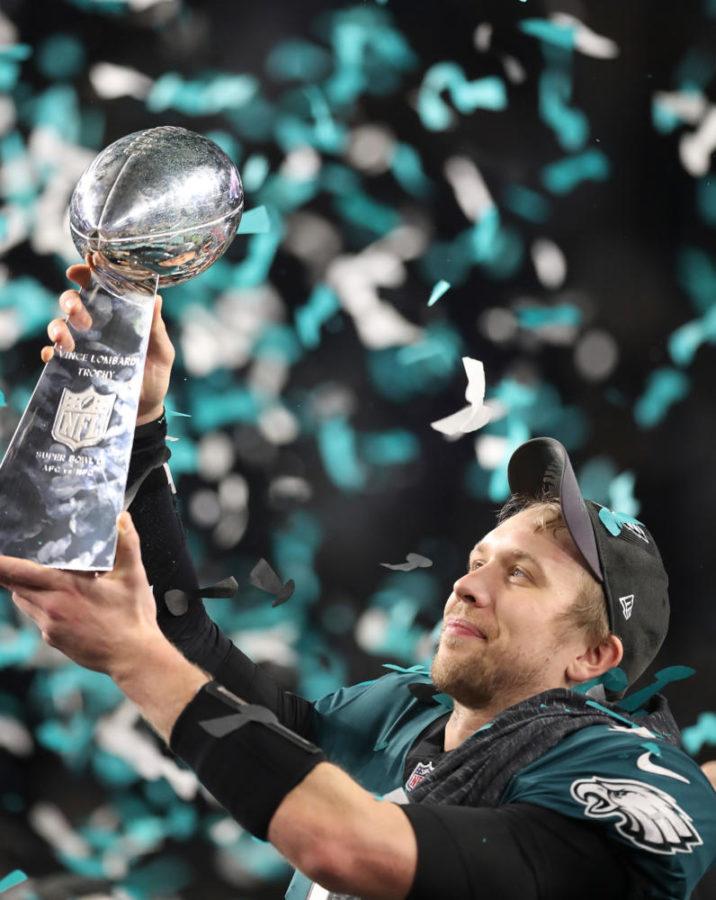Baltimore Ravens long-snapper Morgan Cox ordered a bundle of 15 shirts for Ravens players to wear in August of 2016. On each shirt was the face of their quarterback, Joe Flacco, and a single word — “elite.”
The shirts were a half-serious answer to the ongoing question of whether Flacco is an elite quarterback. That question became a popular topic of debate when Flacco, who was previously fairly average throughout his career, led the Ravens to a Super Bowl title in 2013.
It’s a question that has been asked of quarterbacks before Flacco. It’s become ritual for sports talk shows to debate if a quarterback has reached the vaunted elite status immediately after winning a Super Bowl, as if that’s the only way a quarterback could hope to win one.
The Philadelphia Eagles’ 41-33 victory over the New England Patriots in the 2018 Super Bowl last Sunday stands as proof this isn’t the case.
The Eagles won because of Nick Foles’ stellar playing. The 29-year-old journeyman quarterback took over the starting job from NFL MVP candidate Carson Wentz in December after Wentz went down with a torn ACL.
Foles was great for the Eagles, winning the Super Bowl MVP after throwing for 373 yards and scoring four total touchdowns in the game. This doesn’t make Foles elite — he just had a great playoff run.
The list of non-elite quarterbacks to win a Super Bowl is long. Here is a list of some Super Bowl-winning quarterbacks who started the big game: Jeff Hostetler, Mark Rypien, Trent Dilfer, Brad Johnson and, after beating the New England Patriots Sunday, Foles.
A majority of those guys could walk down Forbes Avenue and no one would recognize them at all, yet they’re all Super Bowl champions. Being an elite quarterback and winning a Super Bowl are not correlated. Teams have won with elite quarterbacks and with quarterbacks who just played well when it mattered.
Of course it helps to have an elite quarterback running the show for your team, but it isn’t necessary. Foles may have led the Eagles to their first Super Bowl victory, but not because he is better than Tom Brady — Foles’ team simply played better on Sunday.
The Eagles were led by great coaching and a great defense that ranked fourth in total defense — a stat that measures the average yards per game a defense gives up — in the regular season.
Foles played great in the playoffs, leading a Philadelphia offense that put up 38 points in the NFC title game and 41 points in the Super Bowl. He got hot at the right time. Perhaps that’s what it takes to win a Super Bowl — not an elite quarterback, just one who plays well enough when it matters. Even still, it isn’t just the quarterback’s job to win the Super Bowl.
Philadelphia’s defense came up big, forcing Brady to fumble and subsequently lose the game. It was head coach Doug Pederson who changed the playbook to make it more simple and comfortable for Foles to succeed after Wentz went down.
Both the 2000 Baltimore Ravens and 2002 Tampa Bay Buccaneers were in similar positions when they won their Super Bowls. Baltimore relied on Dilfer in the 2001 Super Bowl along with their top-ranked defense.
The Buccaneers won the 2003 Super Bowl with the top-ranked defense and Brad Johnson as the starting quarterback. Who’s that again? A quarterback who has been sacked 251 times — nearly a hundred more times than the 165 career touchdown passes he threw.
The Ravens won another Super Bowl with Flacco when they had just 12th ranked total defense during the 2012 season. In the case of that Ravens team, it was a great month of playoff football from Flacco — similar to the one that Foles just had — that fueled their Super Bowl run.
Not every Super Bowl winning team has to have an “elite” quarterback. The Super Bowl is won by the best team. Sometimes that team is led by an elite quarterback, but sometimes it’s led by a great defense or a quarterback who was just good at the right time.
This isn’t specific to just the NFL. College teams have won national titles with quarterbacks who aren’t ever heard of again once leaving college. Do the names Ken Dorsey, Craig Kenzel or Matt Mauck sound familiar? They were the starting quarterbacks when Miami, Ohio State and LSU, respectively won their national titles in the early 2000s.
Mind you, the 2001 Miami team has the reputation as one of the best college defenses ever and the 2003 LSU team was ranked No. 1 in total defense.
The 2003 LSU Tigers were also coached by none other than current Alabama head coach Nick Saban, who is tied with Bear Bryant with six national titles for the most all-time.
Saban has continued to prove that having an “elite” quarterback isn’t necessary to win during his time at Alabama. Greg McElroy, A.J. McCarron, Jake Coker and Tua Tagovailoa have been Saban’s title-winning quarterbacks. None of them went on to lead successful NFL careers.
Tagovailoa was a true first-year who had only played in blowout victories, yet he came in to replace the starter at the beginning of the third quarter during last year’s national title game. He ended up throwing for three touchdowns, including the game winner in overtime.
Foles has now etched his name into a long list of extremely average Super Bowl-winning quarterbacks. He benefited from a great defense, just as Dilfer and Johnson did, and he played a great month of football when it counted, like Flacco.
None of these players are elite, but they’re all Super Bowl champions — sometimes you have one and not the other. Sometimes a quarterback can just be good enough.
The Eagles won the Super Bowl as a full-team effort, not by any “elite” individual setting records for passing. They beat the guy who did that — Tom Brady.


